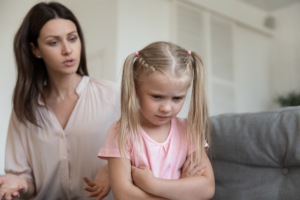As a Co-Parenting Specialist, I work with parents who are incredibly worried that divorce is going to “damage” their children. Of course, as a loving parent, a life changing event like divorce can feel overwhelming. It can bring up feelings of guilt and fear about the long term effects of this decision on the ones they love the deepest…their children.
Research has been ongoing for over 30 years and addresses the emotional effects of divorce on children of all ages. What the studies show is that it is not necessarily “divorce” that damages children, but it is the long-term conflict both before and during the divorce process that is most harmful to children.
How it is managed can have a lasting impact on children.

Here are some of the most important ways in which long-term conflict can affect children:
Emotional dysregulation:
Children, particularly younger children. have not yet learned emotional regulation. They pick up cues from their caregivers on how to deal with the uncertainty of their circumstances. If parents are emotionally dysregulated and do not have the ability to help teach children how to regulate and manage their emotions, emotional distress will be devastating. Constant exposure to conflict can lead to increased stress and anxiety in children. They may feel caught in the middle, torn between their parents, and may experience a range of negative emotions such as sadness, guilt, anger, and confusion.
Negative behavioral issues:
Parents need to be aware that children exposed to ongoing conflict may exhibit behavioral problems both in their home life and at school. One of the most important things that parents can do is communicate with the school about being aware of a transition occurring in the home.
When children are interacting with siblings, parents, and friends, it’s helpful to monitor behaviors such as aggression, disobedience, withdrawal, and difficulty with relationships. Parents are encouraged to have open communication and encourage children to have space to deal with emotions during this transition. Setting boundaries around acceptable and unacceptable behavior with consequences can be helpful.
School problems:
I have noticed that in working with parents, making adjustments because of an on-going high conflict divorce can be helpful. As mentioned above, it’s important to stay in close contact with the schools. The emotional stress caused by conflict can also interfere with a child’s ability to concentrate and perform well academically.
The instability at home may create an environment that is not conducive to learning. It may be necessary to change expectations. Being able to adjust expectations may require co-parents to communicate about changes as this is typically part of joint decision making in a Parenting Plan. There may need to be flexibility in determining what is in the best interest of the child and not what the parent’s expectations are.
Long-term psychological effects:
The longer the conflict exists, the higher the chance will be of long-term issues including depression and anxiety. It is important that parents consider therapy for their children during this transition time. Children may internalize the negativity around them as they do not have the ability to process what they see happening. Because they are not developmentally able to do this, their confidence and self-esteem could be affected. This effect may persist into adulthood and impact their overall well-being.
Chronic stress can lead to struggles with social interactions and forming healthy relationships even into adulthood.
Health issues:
Just as chronic stress is detrimental to adults, it can also have negative health consequences for children. I have noticed in my work with parents that there is often one child who is struggling with health issues that can range from upset stomachs to headaches to eating issues and nausea.
It may weaken their immune system and they become more susceptible to colds and flu and other respiratory illnesses. Sometimes, this can affect their ability to attend school and participate in extracurricular activities. Ongoing conflict can affect physical health and certainly needs to be addressed by a pediatrician.

It’s important to note that the severity of these effects can vary based on various factors including the level of conflict, the way it is managed, and the support systems available to the child. Healthy co-parenting strategies, counseling, and creating a stable and nurturing environment can help mitigate the negative impact of long-term conflict on children. Remember, it’s not necessarily “divorce” that damages children, but how the process is handled.
Parents who are managing their own health and using self-care techniques themselves are modeling for their children how to deal with conflict and stress in healthy ways.
There are no perfect parents, but remembering to “put on your oxygen mask first” is often great advice.
Please reach out for a complimentary call and I would be more than happy to help you and the family you love so dearly.
